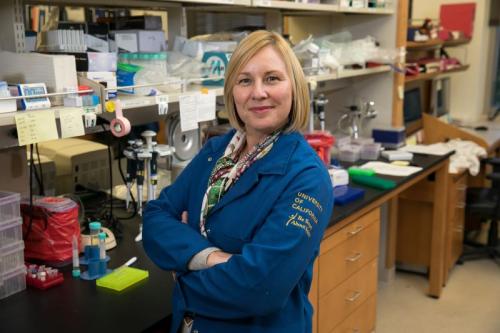
UCLA researcher joins initiative to develop new, low-cost female contraceptives
UCLA researcher Amander Clark is part of a multi-institutional team of investigators that received an $8 million, four-year grant from the Bill & Melinda Gates Foundation to develop new forms of female contraceptives.
The interdisciplinary project, called the Ovarian Contraceptive Discovery Initiative, is a collaboration between Clark’s lab and researchers from Northwestern Medicine, Rutgers University and the Ragon Institute.
“The last major innovation in family planning was the development of the oral contraceptive pill in the 1950s,” said Clark, a UCLA professor and chair of molecular, cell and developmental biology and member of the Eli and Edythe Broad Center of Regenerative Medicine and Stem Cell Research at UCLA. “The goal of this project is to enable the creation of new, accessible and low-cost contraceptives that can be used by women around the world who need additional options for their family planning.”
Contraceptives enable women to make decisions about whether and when to have children. The prevention of unintended pregnancies reduces infant and maternal deaths and increases women’s access to education and economic opportunities. According to the World Health Organization, 270 million women worldwide have an unmet need for contraception.
“In developing countries, where women lack access to contraceptives or family planning information services, family sizes tend to be larger and first-time mothers are younger, which limits their ability to finish school and get higher paying jobs,” Clark said. “Providing women with family planning options that work for them opens up access to education, financial independence and can change lives.”
A major barrier to discovering new contraceptives is the lack of robust systems for studying the biology of human ovulation and fertilization-associated processes. The overall goal of the multi-institutional project is to establish a platform of mouse and human reproductive tissue models that can be used to discover, screen and validate new, non-hormonal contraceptives.
“Not all women are able to take hormone-based contraceptives,” Clark said. “For example, women who have breast cancer may not be able to take them because they could affect their cancer progression or treatment. Being able to develop non-hormonal contraceptives will create more options for women.”
As the leader of one of four subprojects of the overall initiative, Clark will focus on developing human stem cell-derived ovarian organoids that can be used to screen drug candidates. The organoids will be grown from human induced pluripotent stem cells, which are generated by reprogramming adult skin cells back to a stem-like state from which they can generate any cell type.
“Current screening for novel contraceptives is primarily performed using mouse models,” Clark said. “But the goal isn’t to generate contraceptives for mice, it’s to generate contraceptives that work in women, so it’s really important to be able to test the efficacy of candidates in human cells.”
The Northwestern project, led by Francesca Duncan, an assistant professor of obstetrics and gynecology in the division of reproductive science in medicine, will focus on the discovery of new biological pathways that regulate ovulation. Duncan is also the leader of the multi-institutional effort. At Rutgers, Shuo Xiao, an assistant professor of pharmacology and toxicology at the Ernest Mario School of Pharmacy, will lead a project that will use the reproductive tissue models to screen different compounds to identify new drug candidates. And at the Ragon Institute, Alex Shalek, an associate professor of chemistry at the Massachusetts Institute of Technology, will lead the computational analysis of genomics data from all projects to enable comprehensive, cross-institutional comparisons.
